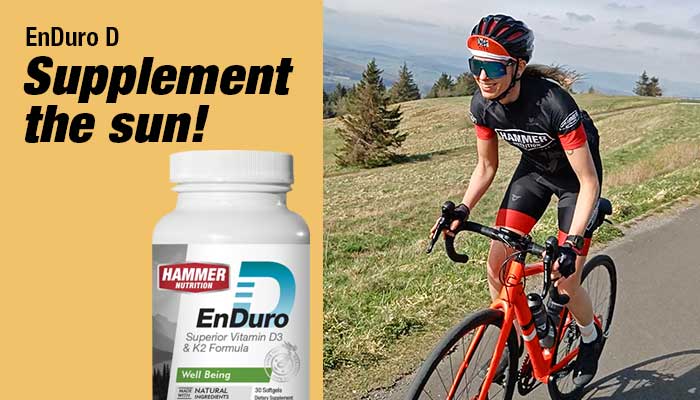
BY STEVE BORN
Prefatory Comments: Many endurance athletes tend to focus on carbohydrate intake and pay less attention to protein. Part of the reason may be the many different types of protein supplements that are available. It can get confusing! Additionally, very few endurance athletes know how much protein to consume on a daily basis. No problem; Hammer Nutrition can help!
**************************
We recommend consuming protein from a variety of sources, both diet and supplements. As an addition to your diet, we suggest that you use one or more of our premium-quality protein powders. Pure protein, without added sugars, artificial ingredients, or unnecessary nutrients, each of our protein powder offerings will supply its own unique benefits and, therefore, provide the most comprehensive support for an endurance athlete's diet.
HOW MUCH DO YOU NEED?
Protein intake from food and supplements should range from 1.2g/kg to 1.4 g/kg to 1.7 g/kg per day. To get your weight in kilograms (kg), take your weight in pounds and divide by 2.2. Then multiply that number by 1.2, 1.4, or 1.7. The answer you get is the number of grams of protein you should aim for daily. Use the lowest amount on non-workout days, use the middle amount for easy/early training sessions, use the higher amount for periods of periods when you increase training volume and intensity, and use the highest amount during your peak training and racing season.
EXAMPLE:
180 lb. person = 81.82 kg.
81.82 x 1.2 = 98 grams of protein daily
81.82 x 1.4 = 114.5 grams of protein daily
81.82 x 1.7 = 139 grams of protein daily
HAMMER WHEY PROTEIN
Unless you are allergic to dairy (not intolerant, allergic) or adhere to a vegetarian/vegan diet, you will arguably not find a better protein source for recovery and many aspects of overall health than Whey Protein. Here are just a couple of reasons why:
-
Superiority in protein measurement standards. No matter what measurement of protein quality is used—Biological Value (BV), Protein Efficiency Ratio (PER), Protein Digestibility-Corrected Amino Acid Score (PDCAAS), Net Protein Utilization (NPU)—whey protein comes out on top, with whey protein isolate being the preferable form of whey protein. Hammer Whey Protein is 100% whey protein isolate.
-
Richest source of all nine essential amino acids. Histidine, isoleucine, leucine, lysine, methionine, phenylalanine, threonine, tryptophan, and valine are designated as “essential” because the body cannot make them and must be obtained from outside sources. Whey protein isolate has the highest volume of all nine essential amino acids, including the all-important branched-chain amino acids (BCAAs).
- Extraordinary immune system-boosting properties. Whey protein contains excellent levels of glutamic acid, cysteine, and glycine—the three amino acids required for glutathione production. Many experts consider glutathione to be the number one antioxidant of all. Additionally, whey contains special proteins called immunoglobulins that stimulate immune function.
For more, see “Stay Strong and Stay Healthy.”
ORGANIC VEGAN PROTEIN
For people who cannot tolerate dairy or soy-based proteins and/or whose dietary preferences require the consumption of alternate protein sources, Hammer Nutrition’s Organic Vegan Protein is the perfect solution! It contains the following five outstanding, 100% organic, plant-based proteins:
- Organic Pea Protein: An easily digested protein with an excellent amino acid profile, containing leucine, isoleucine, valine (the three BCAAs), lysine, arginine, and glutamine.
- Organic Pumpkin Protein: Derived from the nutrient-rich seeds, pumpkin protein is a complete protein source rich in antioxidants. It is also plentiful in vitamin K and the minerals calcium, iron, magnesium, manganese, zinc, and more.
- Organic Sacha Inchi: Derived from the seeds of the South American Plukenetia volubilis plant, sacha inchi is considered a complete protein source because it contains all nine essential amino acids. It is also an excellent source of the essential omega-3 and omega-6 fatty acids.
- Organic Spirulina: A microscopic single-celled alga, spirulina is a complete protein source and has the highest concentration of protein by weight of any food. Spirulina is vitamin- and mineral-dense, rich in enzymes and antioxidants such as superoxide dismutase, and a potent source of chlorophyll (second only to chlorella) and essential fatty acids. Spirulina is also considered a blood-building nutrient, primarily due to its polypeptide content (called phycocyanin), and is believed to help maintain digestive system health by serving as a food/fuel source for beneficial intestinal flora.
- Organic Chlorella: Another single-celled alga and complete protein, loaded with chlorophyll and essential fatty acids, chlorella is perhaps the most vitamin- and mineral-dense "green food" available, and it includes a complete B vitamin profile. (Chlorella has more vitamin B12 by weight than liver!) Chlorella also contains naturally occurring RNA and DNA for assisting in cellular growth and repair, and is considered an "eye health" nutrient, courtesy of its beta-carotene and lutein content.
HAMMER SOY PROTEIN
Though often (and incorrectly) maligned, soy is an exceptional protein for numerous general health benefits for both men and women. The 100% GMO-free soy protein isolate in Hammer Soy Protein contains multitudes of health-enhancing phytochemicals, which are believed to be beneficial for cardiovascular health, prostate health, optimizing cholesterol levels, helping protect against osteoporosis, and much more. See “Is Soy Protein Bad for Your Health?” for more on soy protein’s benefits.









4 comments
This is great comparison of different types of protein. Thanks for sharing.
provides perspective to manage your weight level and possilby reduce lbs to a better performance
level.
thanks
Hi all. Longtime customer here. #295, lol.
Hey I was wondering if your experts have looked into the new pure Amino Acid supplements? They claim to have better utilization the body and has less calories.
Thanks for any of your insights on the new wave of Amino Acid supplements out on the market.
John Rahhal
———
Hammer Nutrition replied:
Hi John. Wow! A low 3-digit client number? You have most definitely been with us for a looooooooooong time, and we really appreciate it! Thank you also for your excellent question. Most of the amino acid products I’ve come across provide only the 9 Essential Amino Acids (EAA), and while that’s certainly beneficial, a complete protein powder will provide all the EAA, along with the rest of the amino acids needed for optimal health. While the calories supplied by an encapsulated/tablet amino acid supplement will certainly be less, a serving of Hammer Whey Protein (for example) contains only 70 calories… the difference is negligible, in my opinion. As far as absorption rates are concerned, compared to an amino acid supplement in a capsule or tablet form—especially the latter (one company states that their product is absorbed in approximately 23-30 minutes, which I find to be a lengthy time period)—a protein powder will be digested much quicker (no need to break down tablets or dissolve capsules), allowing the amino acids to be readily available to the body. And as is always the case with amino acid capsules/tablets, you need to take quite a bit of them. For example, each serving of Hammer Whey Protein contains 15 grams of protein. To get that same amount from many encapsulated/tablet products—which are usually 1 gram at the most—you’d need to take 15 of them, if not more… yikes, that’s a LOT of capsules/tablets to swallow! Additionally, Hammer Whey Protein also contains 6 grams of glutamine per serving; you won’t get anywhere near that much, if any at all, of this important amino acid via a capsule/tablet supplement. Lastly, in general, amino acid supplements in capsules or tablets are significantly more expensive than a protein powder, simply because of the product being in capsules or tablets and also because of how many of those capsules/tablets you’re required to take. Given all this, while capsule/tablet products can be quite handy and arguably slightly more convenient, I do not find them to compare very favorably overall to our premium-quality protein powders. – SB
Thanks for the info.
Al